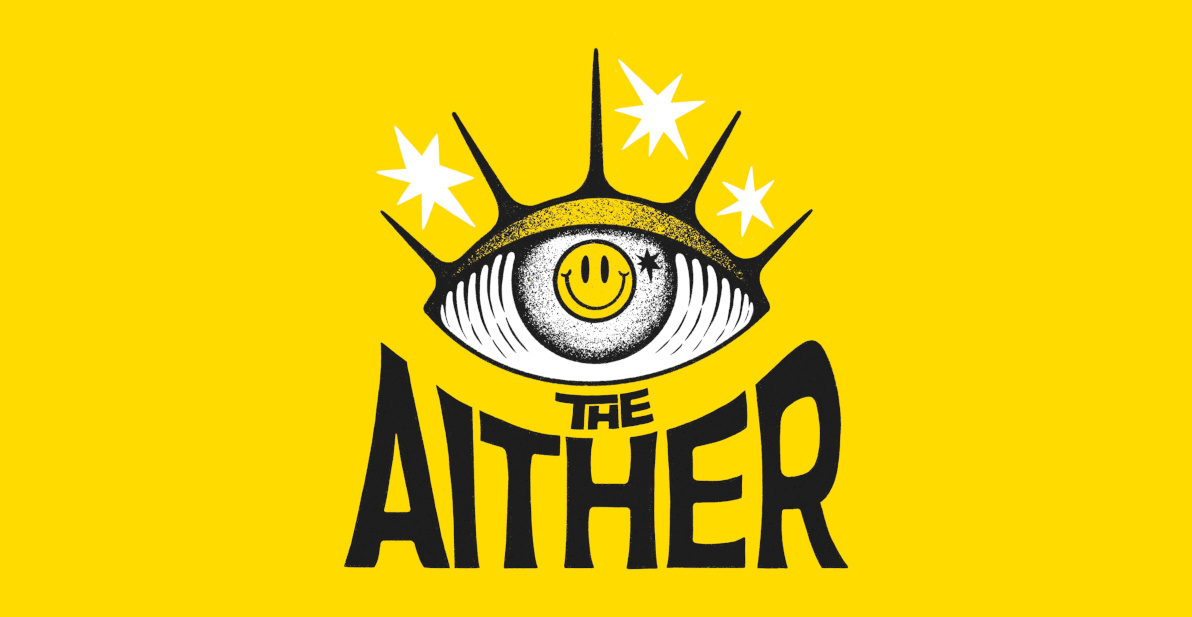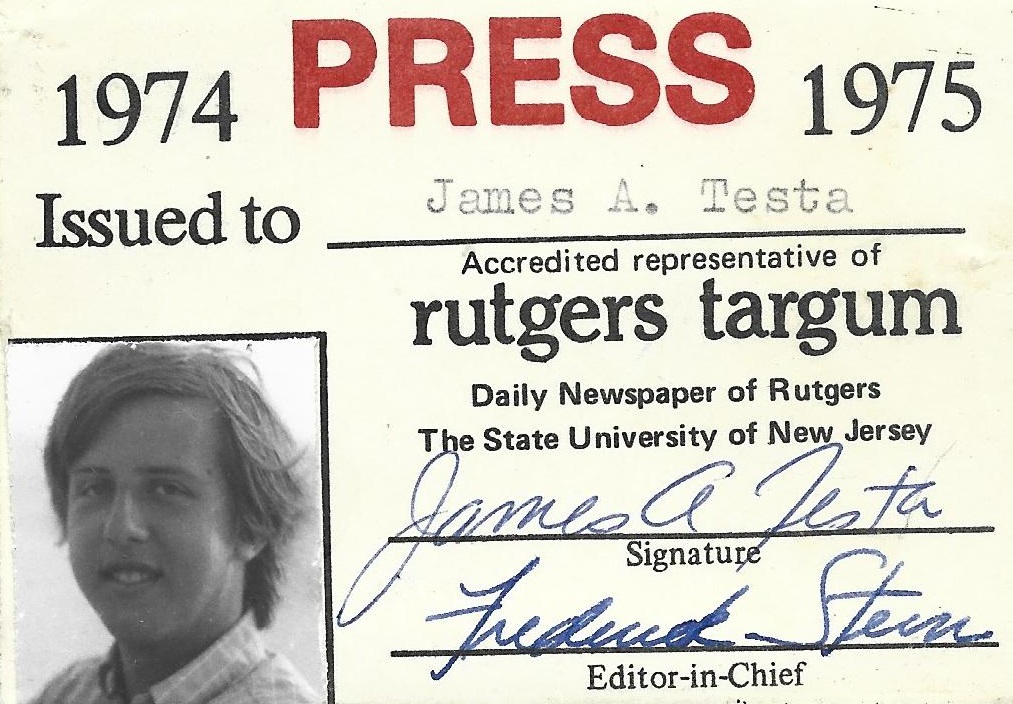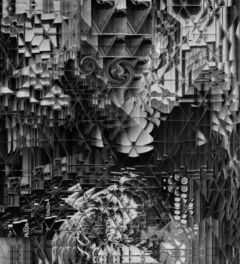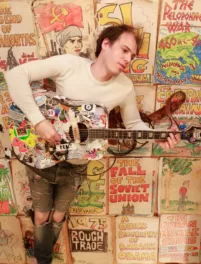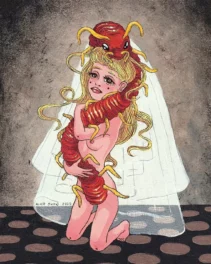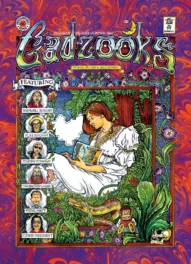Jim Testa has been a force in music writing since the early 1980s. If you go to an archive and look at old fanzines… or new fanzines… you’re likely to see his by-line.
Journalism is in his blood and he started young. From writing for his high school newspaper in the 1960’s, to being news editor for his college paper, Rutgers College’s Daily Targum, in the 1970s.
Born in 1953, Jim is New Jersey through and through. Along with Patti Smith and Bruce Springsteen (and Jon Bon Jovi?), he has helped make New Jersey more than the poor cousin of New York.
He’s a staple of Jersey Pride.
Coming from a journalist background, in college Jim became the campus stringer for the Associated Press (for $25 /month.)
That was the first time he got paid to write.
During his junior year, students took over the main library in a protest about tuition. Jim wrote about it on the spot from a payphone in the occupied library. He had quite a few stories go out over the Associate Press wire that way.
But it’s music that made Jim important.
For Jim, writing and music are passions.
Jim’s music writing started with his tenure at The Aquarian Weekly (a Village Voice type newspaper based in Montclair, NJ) and the Washington DC paper Discords.
In 1982, Jim published the first issue of his zine, Jersey Beat, that continues through today, though now it’s an online publication.
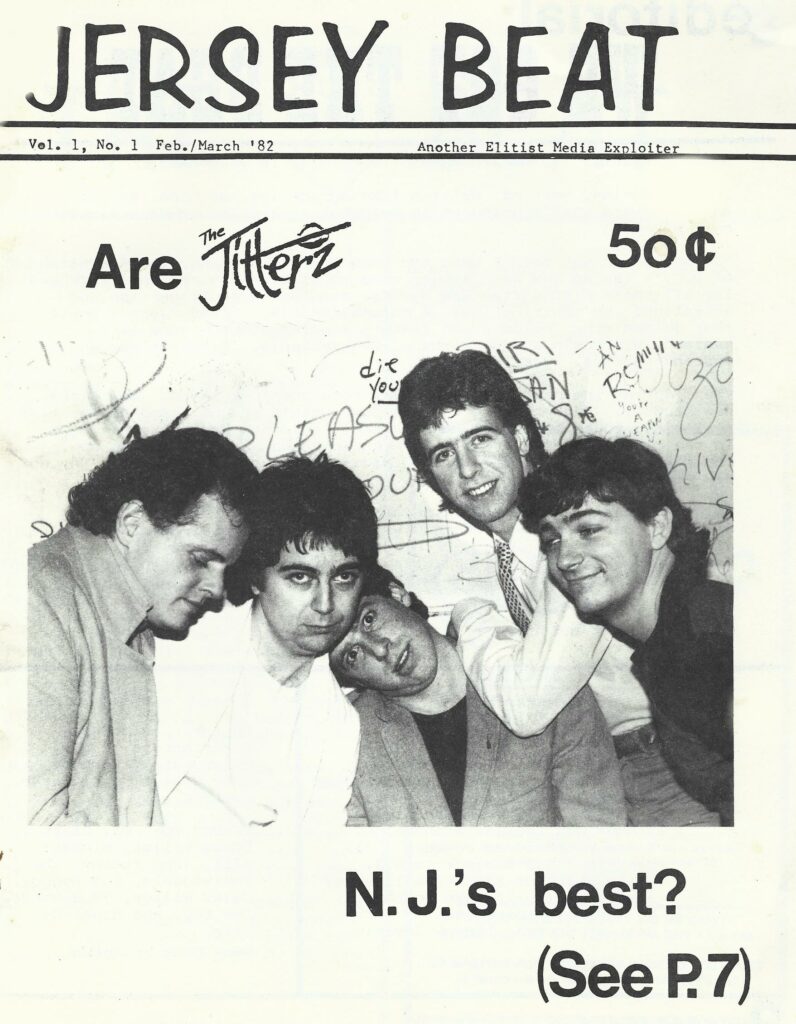
Published March 1982
Jim is dedicated to music.
Not only to listening to it, but deeply thinking about it, and making it himself.
Unlike most music writers, who want a celebrity scoop, or to pose for pictures with the stars… Jim’s joy comes in introducing bands, people and styles you never heard of.
He’s more interested in showing off his discoveries than showing off himself.
Jim will travel thousands of miles to meet, mingle, learn about, and sometimes make music with others. He’s interviewed more music people, than I have fantasized inseminating… and that’s a lot.
He’s thoughtful, fair, open-minded and… well you’ll see.
You may know the Queers, the Bongos, the Smithereens, Bouncing Souls… They never made it beyond big cult status, but if you know them, Jim is likely at least one reason why.
In the 1990’s, when the mainstream media suddenly needed writers who could intelligently discuss punk rock, publications like Rolling Stone, Guitar World, Sam Goody’s Request Magazine and others come knocking. Eager for Jim’s insight into hitherto underground music.
These days, Jim is teaching special-ed in a local public school.
He’s still doing Jersey Beat, and writing for enough publications to win in an award at it too.
I’m proud to have him as a friend…
It’s not only me. Jim worries and takes care of people, some who he hardly knows… or just knows through someone else.
I’ve never heard him yell in anger at another person, though sometimes he’ll jest: He once wrote that I was “a professional asshole.”
I did resent the word “professional.”
Although I see Jim every once-in-awhile, this interview was done via email. That form lets the interviewee consider his answers, and do research into his own history.
[I’ve also included Jim’s contact information at the end of the interview. If you’re interested – and you should be! – you should contact him.]
Take a dive into the world of Jim Testa, below…
Name + D.O.B?
James Albert Testa, Feb. 1953.
Albert (or Alberto) was my great-grandfather. He immigrated from Italy and wound up in the Pennsylvania coal mines, said “fuck this!,” and emigrated to Brazil, where he operated a coal furnace.
When he had saved up enough money, he brought his wife and children back to America and bought the house in which I was raised.
City, State and Country you currently call home?
Weehawken, NJ, USA.
City, State and Country you’re from?
Weehawken, NJ, USA.
I like it here.
Please describe some memories – such as art, music, friendships, adventures, study, romance, politics, travel, work, religion, crime… anything really – from the stages of your life noted below:
* Your childhood:
Happy, working class, Italian-American, Roman Catholic (an altar boy, even) until I came to the realization that the whole thing was as much of a scam as Santa Claus.
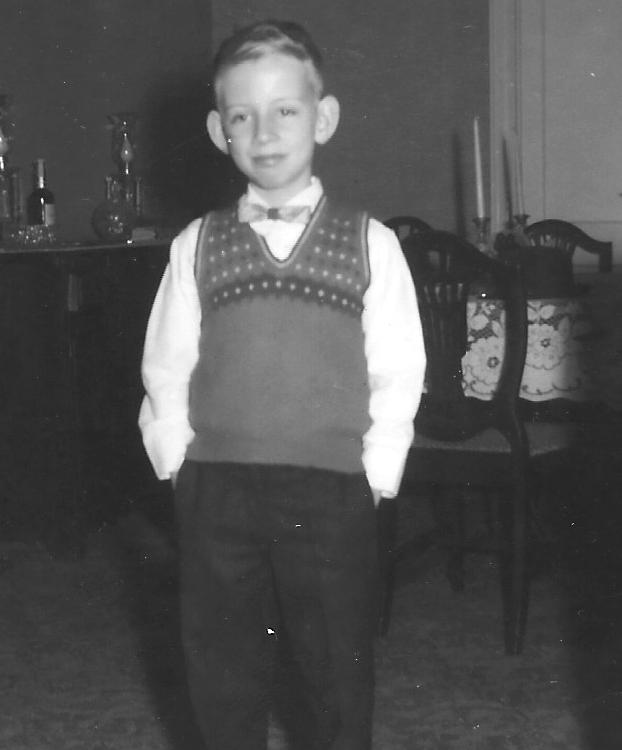
* Your teenage years:
Bookworm, chess, marching band.
I was liked but had no social life.
I did read my way through much of the Weehawken Public Library though.
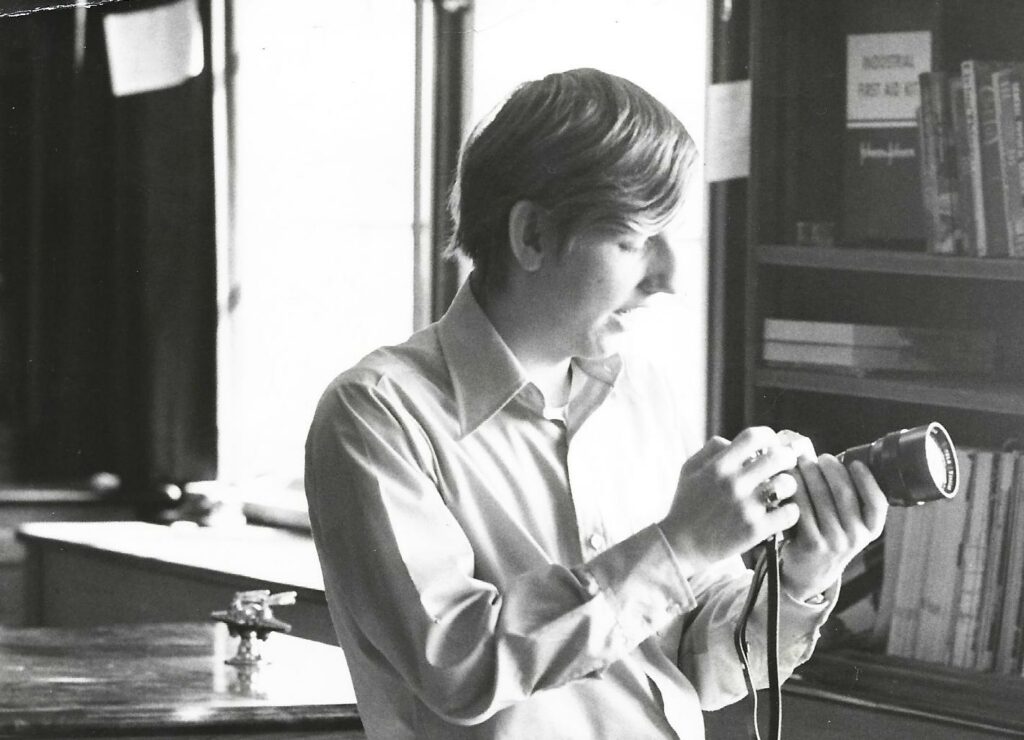
* Your 20s:
College was great, I bloomed and discovered myself, spending most of my time learning how to publish a daily newspaper at the Rutgers Targum.
Despite spending five days a week at the paper, I graduated Cum Laude and managed to cram in a ton of courses on pop culture – Film, art, scifi, even the Bible.
The rest of my twenties were mostly wasted, hanging out with nerdy high school friends, trying (mostly unsuccessfully) to pick up girls at disco, and playing video games in bars.
Missile Command was our favorite.
I did some freelance writing for The Aquarian Weekly on film and theatre but couldn’t find a newspaper job (it was the “Ford To City: Drop Dead” Recession.)
Finally a family friend got me a clerical job at an insurance office. It was a paycheck.
I stayed and learned the brokerage business.
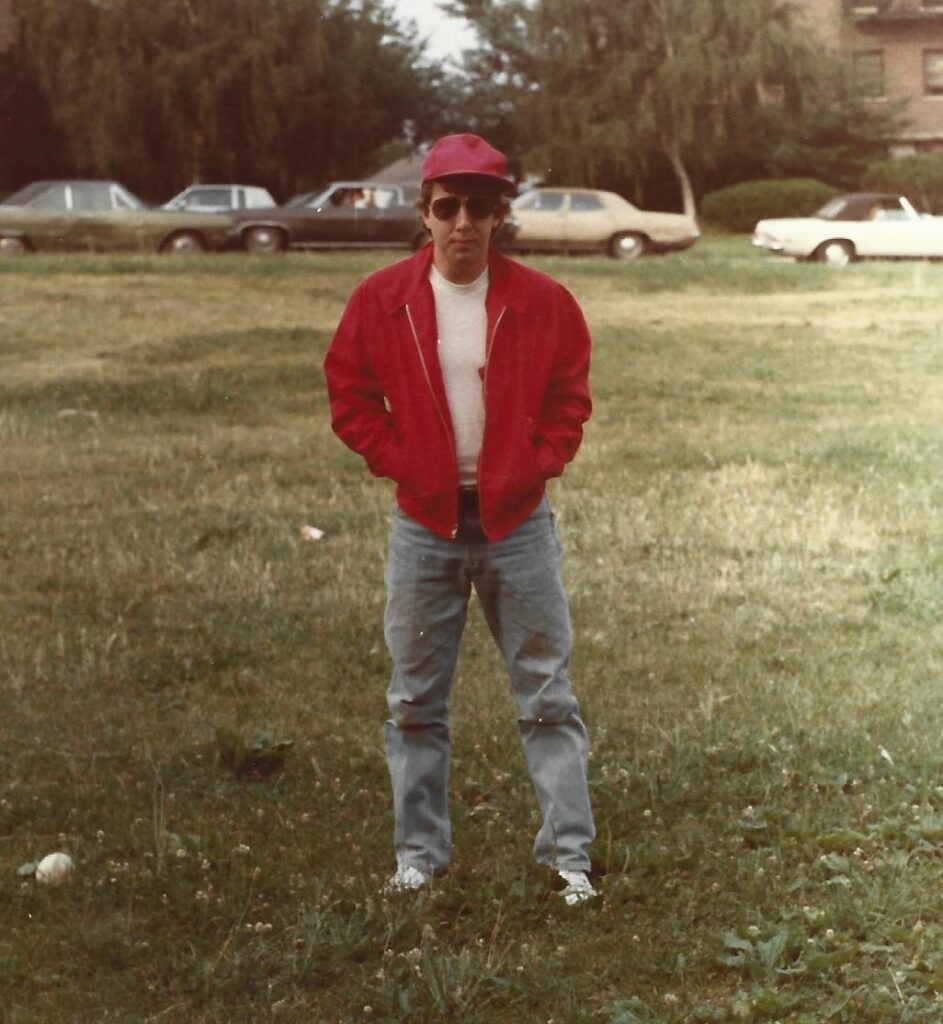
* Your 30s:
Somewhere in there, Punk happened.
Then hardcore, then indie rock.
At age 27, I started hanging out at Maxwell’s.
At age 29, I started publishing Jersey Beat.
That set the course for my 30’s.
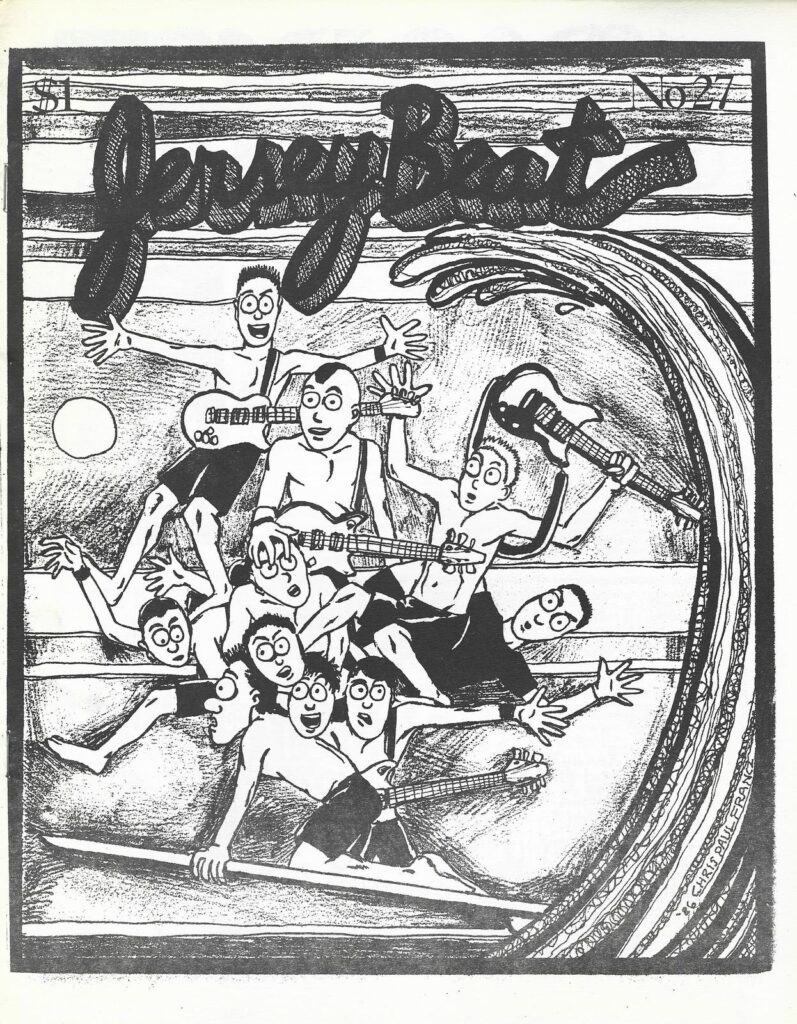
* Your 40s:
Nirvana and Green Day happened in the 90’s during my forties. My little fanzine suddenly became important, at least for a little while, and much like Pinocchio, grew into a real live magazine.
I became a real writer too – Rolling Stone, Request, Guitar World all suddenly needed people who could write intelligently about all the punk bands getting signed to the majors.
Meanwhile, I continued to work in insurance to pay the bills and started to develop a reputation as a writer, in part by going to music conventions like SXSW, CMJ, and New Music Seminar and making an impression on writers and editors.
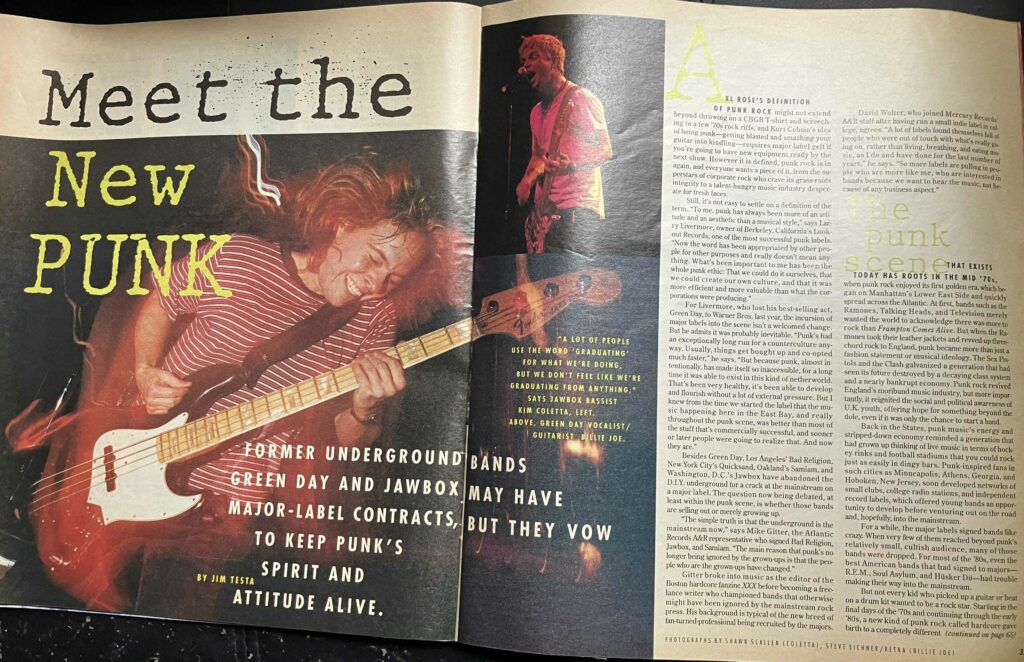
* Your 50s:
I started writing a weekly column about music for my local newspaper, The Jersey Journal.
Inspired by Dorothy Parker’s book review column “Constant Reader,” I called it “Constant Listener.”
The Internet happened.
Then Napster.
Then the music industry imploded.
Independent distribution dried up, as did advertising. Sales plummeted, for the indies that supported zines as well as the major labels.
In 2007, after 25 years, I published the final print issue of Jersey Beat, #77. The zine already had a website, so we just beefed it up and became JerseyBeat.com, an online music magazine (also a bit ahead of the curve.)
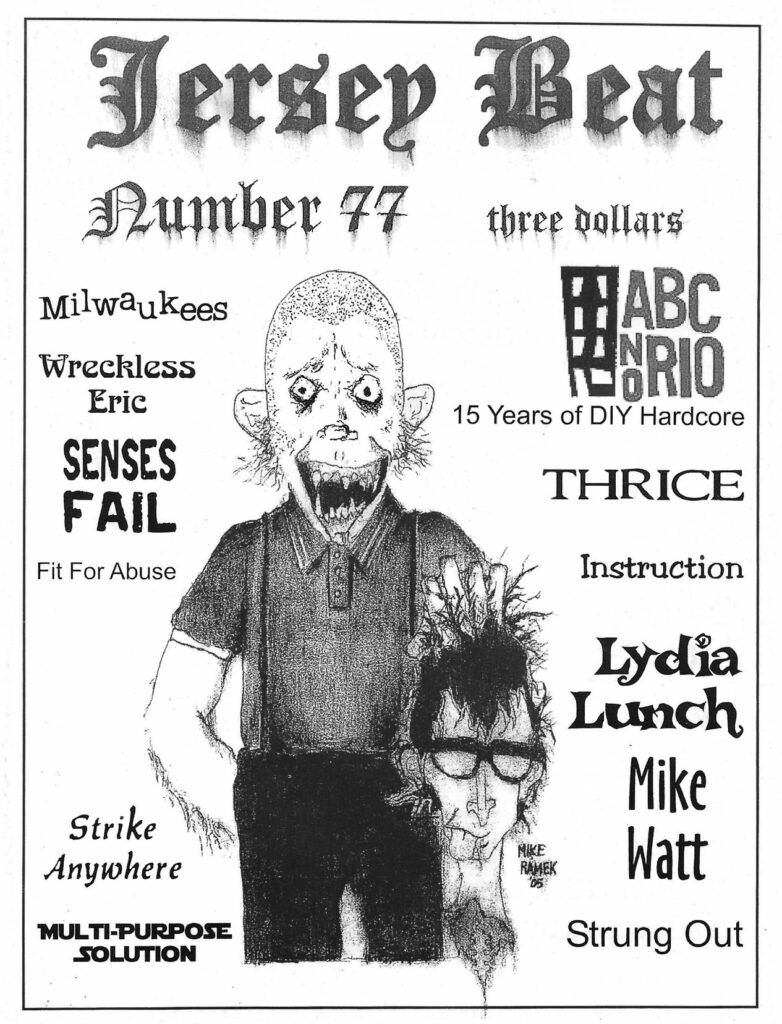
Published in 2007.
* Your 60s so far:
Can’t complain.
The insurance industry decided it didn’t need me anymore in 2013.
I worked the door at an underground nightclub for two years until it closed, then went on Social Security and started working as a substitute teacher. I discovered that I was really good at it and enjoyed it.
Who knew?
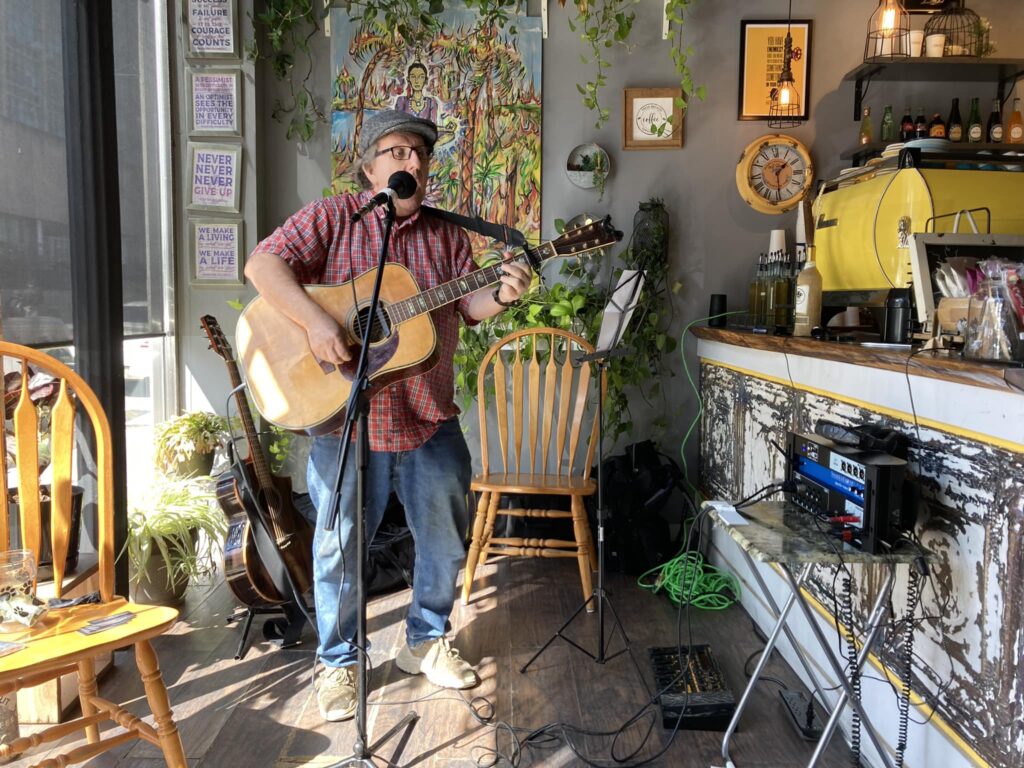
We’ve known each other since before most people reading this were born…
Some of the following questions are, therefore, based on that prior knowledge…
How does being from an Italian background affect your attitudes toward life and your day-to-day living of it?
Do you agree that being Italian has a lot in common with being Jewish?
I am going to take these together…
I have always thought (and I am not alone) that Italian Catholics and Jews had a great deal in common culturally, from guilt-tripping mothers to strong family bonds. I also immersed myself in Jewish humor from early childhood, from the Three Stooges and the Marx Brothers to Woody Allen to Seinfeld.
My favorite quote is probably Lenny Bruce’s,
“Even if you are Catholic, if you live in or around New York, you’re Jewish.
If you live in Butte, Montana, you are going to be goyish even if you are Jewish.”
I was lucky. My parents raised me to treat everyone equally, I never heard a word of bigotry around the kitchen table.
We valued family and food, and alcohol was something that enhanced a meal or celebration; my dad enjoyed a beer, sometimes a whiskey sour, but I never saw anyone in my family drunk as a child.
My mother smoked like a chimney (and died of lung cancer,) so I hated the smell of tobacco and never touched a cigarette.
Drugs never interested me.
When and why did you first become interested in music?
What inspired you to write about it?
There was always music around my house. My great-grandfather had a collection of operas on 78’s. My father had a big vinyl collection of his generation’s music – Sinatra, Ella Fitzgerald, Basie and Ellington, and Broadway cast albums.
On Sundays, after church, he’d play records while we waited for Sunday dinner. It was my favorite time of the week.
I started playing alto sax in 5th grade and was in marching band and orchestra through high school graduation.
My own high-school graduation was the last time I touched a sax. That was high school Jim. Time to say good bye.
I do regret that now.
It would have been cool to play the sax during the ska boom in the Nineties.
But even with music constantly in my household, I didn’t grow up a huge pop music fan.
I was aware of the Beatles and Supremes and Beach Boys, and all the other performers we’d see on Ed Sullivan, but my earliest records were comedy albums – Alan Sherman, Soupy Sales, Tom Lehrer, Spike Jones.
In high school, I became a big Simon & Garfunkel fan – “Bridge Over Troubled Water” got me through senior year – but I was still more of a reader, not a music person.
That changed in college.
I did a deep dive into Bob Dylan (who had never interested me before,) then discovered John Prine and Loudon Wainwright III and Dave Von Ronk and other quirky singer-songwriters. I taught myself how to play acoustic guitar and friends introduced me to the Velvets and Stooges, Big Star and the Raspberries.
I started going to concerts.
Then my college friends started a band – a jokey pop act called Bad Taste & The Crabs – who were heavily inspired by Shel Silverstein and the young Bette Midler. The bass player was named Howard Wuelfing; remember that, it’ll come up later.
A guy in my sophomore dorm turned me on to Bruce Springsteen’s first album, and I reviewed his second for the Targum. (“Entertaining but no commercial potential,” I opined.)
Interestingly, after graduation, I got paid (a little) to write about film and theater for the Aquarian Weekly, and would have loved to do that for a living. Alas, opportunities were few and far between; but for a while, I wanted to be Rex Reed and not my other hero, Jimmy Breslin.
By the way, if there’s one writer who influenced me as a journalist and writer, it was Breslin – not Lester or Hunter S. Thompson or Christgau.
Breslin didn’t worship the muckety mucks, he cared about the little guy. He didn’t interview celebrities; at JFK’s funeral, Breslin talked to the gravedigger. And when NYC’s neighborhoods started to go to hell in the 70’s, it was Breslin who rattled the doorknob of the local public library and found it locked.
In the late 70’s, a few years after graduation, my college friend Howard Wuelfing (that guy again) had eloped to D.C., played bass in The Slickee Boys, and started a fanzine called Discords (which pre-dated the Dischords label.)
The zine had a broadsheet newspaper format and looked very official; my friend’s wife worked at the Chronicle of Higher Education and they’d professionally typeset the zine after everyone else left work.
Discords had scene reports from L.A., Minneapolis, and Chicago, and I did a column mostly about Hoboken called “Jersey Beat” (a pun on Mersey Beat.)
When Wuelfing’s wife kicked him out, Discords was over. But I was having so much fun writing about my local scene that I decided to start my own fanzine and used the name of my column. Jersey Beat #1 was left on the cigarette machine of Maxwell’s in March, 1982, and in a scene where everyone was known for either being in a musician, artist, or writer, I became the zine guy.
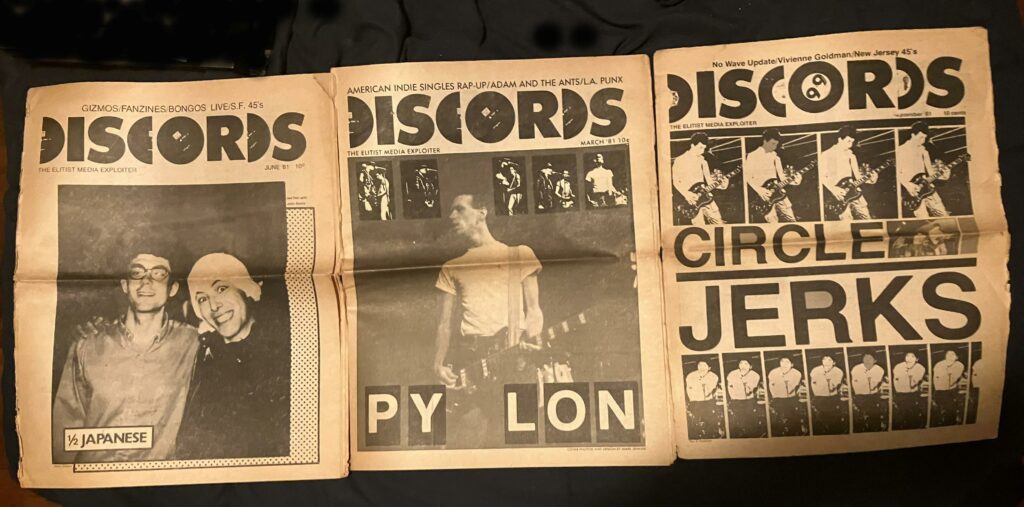
What started you on your path to being an Award-Winning Music Writer?
Can you also tell us about the awards specifically, and how they came about?
Every writing opportunity that’s come my way was a result of publishing myself in Jersey Beat and writing for free in other 80’s fanzines (The Bob, Matter, Boston Rock and The Noise in Boston.)
My friend and Jersey Beat contributor Jim DeRogatis was working as a reporter at the Jersey Journal, and would occasionally write about music as well as covering the news beat. When he moved to Minneapolis (and later to Chicago, where he became pop music critic at the Sun-Times,) he recommended me to his editor as someone who could cover local music. I did the Constant Listener column for ten years through the Nineties until cutbacks resulted in my being laid off.
Then a few years after that, the Jersey Journal became part of NJ.com (an aggregator site that posts news from multiple NJ newspapers) and asked me to come back.
I’ve been doing a weekly column since 2010 focused exclusively on local music.
Last year, I won First Place for arts reporting in the annual press awards bestowed by the NJ Press Association. (The NJPA eliminated my category this year.)
I’ve won the “Living Legend” award at both the short-lived Hoboken Music Awards and the more established Asbury Music Awards, and Jersey Beat has won a few awards from fanzine organizations over the years.
Seriously, none of them were that big a deal, it’s not like winning a Pulitzer or Peabody.
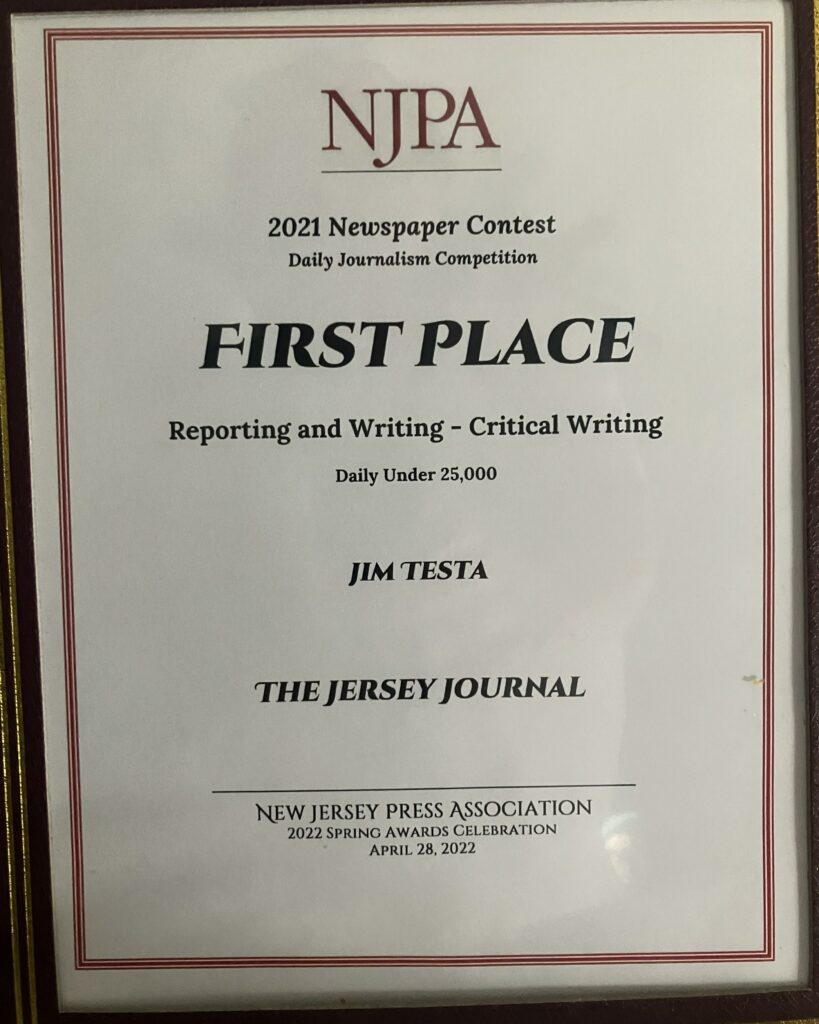
Among music critics/writers, maybe the most famous in my lifetime was the NY Times critic Robert Palmer (no relation to the musician of the same name.) I learned a ton from him.
Later came Lester Bangs and Robert Christgau.
Where do you fit in among that group?
Is there a current God of Music Writers? (Beside you, I mean.)
Christgau is still around (although he does a private SubStack now) as are many of his peers who wrote for the early Creem, Rolling Stone, and big-city newspapers, but I think the era of the celebrity rock writer (ala’ Lester Bangs) is over.
There are still people who are widely respected, like Jon Caramanica at the NY Times or Chris Morris at Variety, but no one really knows or cares who writes for Pitchfork or today’s Rolling Stone.
I kiddingly call myself the Dean of NJ Rock Journalists (modifying the broader title Christgau gave himself) but the truth is that there isn’t any competition; there are some excellent NJ writers who have been at it for many years (Jay Lustig, Bob Makin, Chris Jordan) but none of them ever achieved a national profile.
At least some people in punk, hardcore, and indie rock around the country kind of know who I am.
What musician, despite his (or her) celebrity, has maintained a down-to-earth friendliness and unsnobishness that’s rare in rock’and roll?
Actually, what I’ve found more rare are musicians who don’t remain friendly and down to earth after success.
At a certain level of celebrity (like a Bruce Springsteen,) you have to erect barriers or you’d have no private life, but I’ve run into very few musicians who got “too big” to talk to me. That may be due to my coming out of the DIY punk/indie community and not mainstream pop though.
I would say the gold standard for staying true to your roots are The Bouncing Souls, but I honestly don’t find humility that rare a commodity.
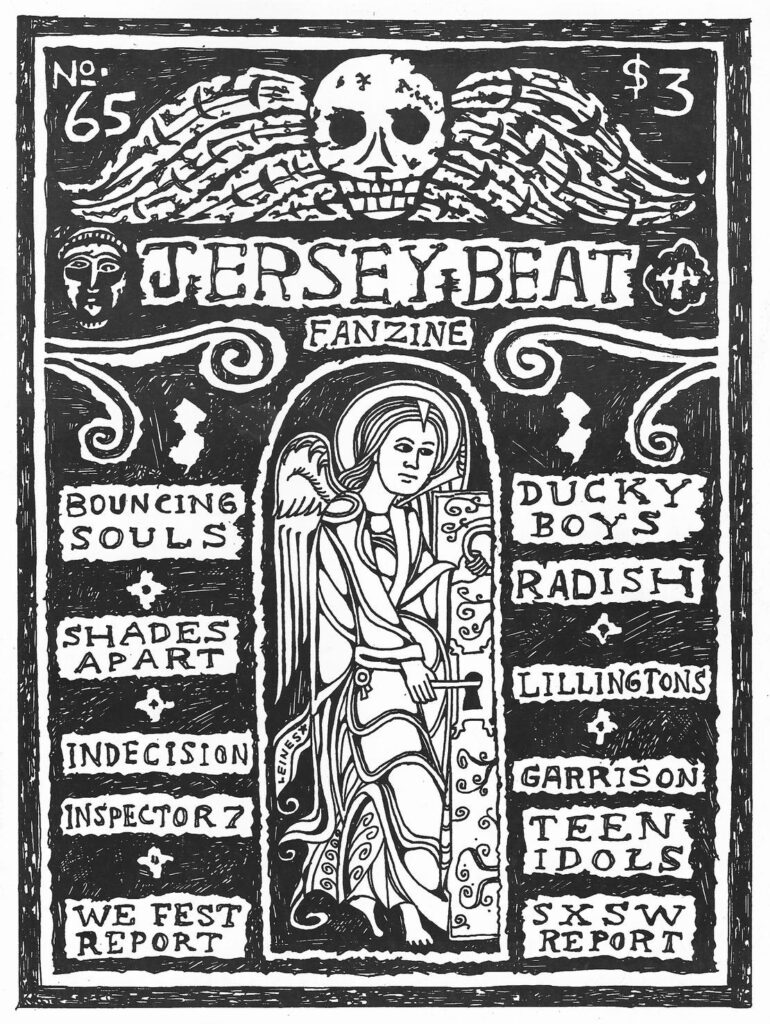




Specifically #65 from 1999, #70 from 2001, #71 from 2002, & #’s 75 & 76, both from 2004.
Do you enjoy having your picture taken with celebrities?
Oddly, I’ve never been into that.
It might be because I came into zines from a traditional journalism background and considered asking for a selfie unprofessional.
What musician have you seen changed the most by fame?
I honestly don’t know enough famous people personally to answer that question.
Christgau coined the term “semi-popular music” years ago for the kind of musicians that have always been my niche, respected and sometimes even gainfully employed artists who never achieve “hitmaker” status.
Who is the nicest guy in punk rock (living or dead)?
Off the top of my head, Mike Watt, Chris Butler, and writer Jaan Uhelszki (of the original Creem staff.)
When I started reading Jersey Beat last century, there were all these pictures of attractive young men naked from the waist up. That seemed to change in the millennium.
What happened?
Hindsight has warped your perception, I’m afraid; I went through the first 35 issues of Jersey Beat and found only four shirtless photos, and they were all lead singers in hardcore bands.
What you’re remembering is the little extra zine that I’d stick into copies of Jersey Beat in the first five years or so that was called either Teen Punk or Punk Teen (it flipped back and forth.) That was a very deliberate attempt to treat a lot of this crazy, minimally popular underground music as pop culture.
(And we were covering, among other things, the early hardcore scene, which tended to be pretty sweaty anyway.)
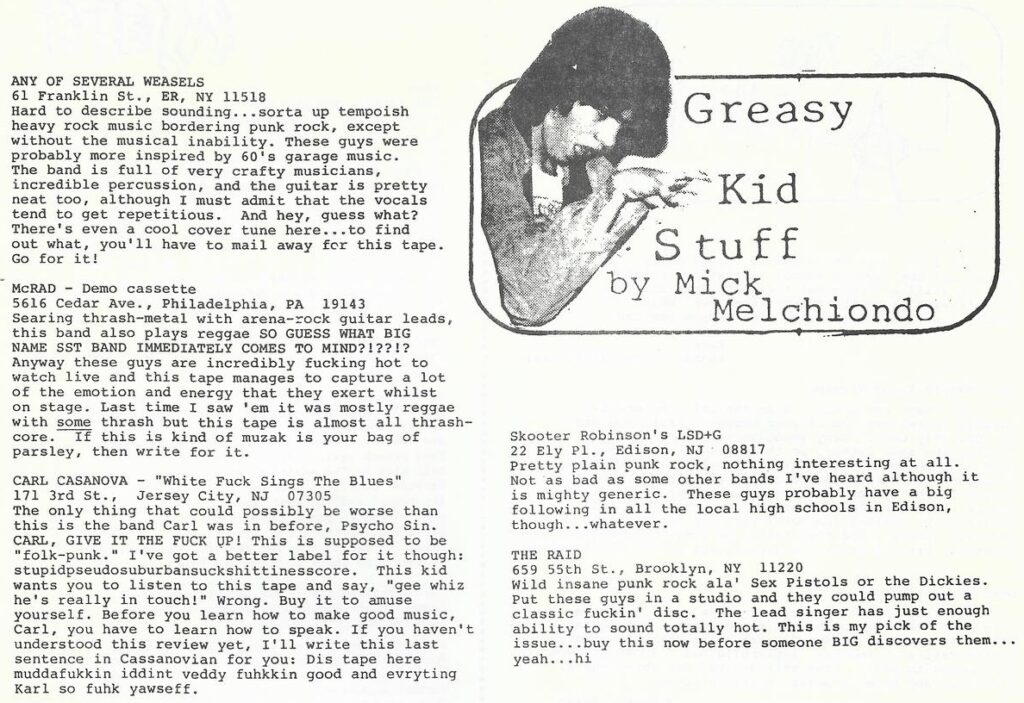
This one ran in Jersey Beat No. 31, from July 1987.
The name Jersey Beat was obviously a pun of Mersey Beat but I also wanted it to be a riff on Tiger Beat. A lot of early Eighties zines were notoriously humorless and I thought it would be fun to do a fanzine that had pin ups and contests and goofy headlines, so you’re right to a certain point.
Style-wise, I was trying to make Jersey Beat look like a teen mag, but the pinups of Paul from AOD or Davy from Kraut (or the cartoon pin up of Glenn Morrow) were fully clothed. Sorry.
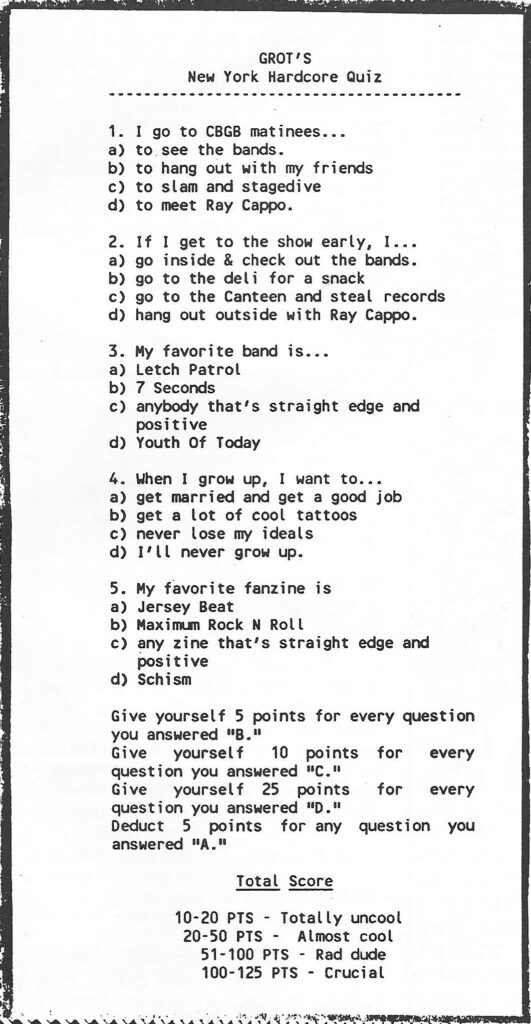
With Jersey Beat getting a mention in question 5.
That trope wore itself out in a few years anyway and I got as serious as everybody else, especially by the Nineties when our page count and distribution seriously increased.
The zine never made a profit but we did break even for a long time; the more money that came in, the more I would spend on the next issue, and we wound up doing 126 pages plus a glossy color cover in the last several years. As technology progressed, I also started doing layout on a computer instead of just cutting out typed copy and pictures and pasting it all together with rubber cement.
That’s another reason why the teen zine format didn’t survive the transition from our early days as an offset local zine to a much bigger and widely wide newsprint magazine.
My efforts in that regard did not go entirely unnoticed, however. In the early 80’s, homophobia was all the rage and zines like Conflict and Forced Exposure would get really angry and make “fag” jokes about us in print, which I always found amusing.
I had a cartoonist named Dave Run It (aka Dave Brushback, real name Dave Zukauskas) who created funny comic strips about those guys, so we fought back with humor.
(Years later I met Byron Coley of Conflict at a wedding and he greeted me like he was my biggest fan. To him, it was all just a big joke.)
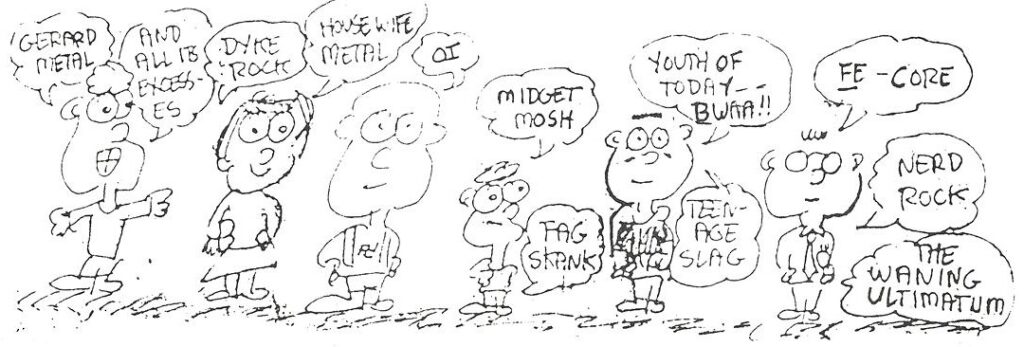
Orignally published in Jersey Beat #32, from October 1987.
Is there a style of music you hate and would never listen to?
If so, what is it?
I can honestly say that I would never say I hate an entire genre of music, although obviously I like some things more than others. Even a band I might have said I hated years ago (like the Grateful Dead, REO Speedwagon or the Eagles) had a couple of good tunes, no?
I would say that the one genre I can’t listen to is power violence or screamo, where there’s no melody, just percussion and feedback, and the singer sounds like he’s gargling with Drano. I always wonder why those guys bother writing lyrics since it’s all indecipherable noise anyway.
Do you ever lie in an interview or review? That is make something up or change something to be more interesting or flow easier than the reality.
If so, were you called out on it?
If not, has telling the truth ever gotten you into trouble?
You have to remember that I was managing editor of a college newspaper during the Watergate era; I took (and take) journalism seriously and I’ve always approached even reviews that way. So no, I can’t think of a single time I either purposefully lied or just invented something (like Hunter Thompson) to improve a story.
I wouldn’t say telling the truth has gotten me in trouble but it has made people mad at me (which may be the same thing.)
In 1985, in Matter fanzine, I quoted one of the Butthole Surfers saying something that made the band seem, let’s say, unsophisticated and unworldly; Gibby wound up threatening Maxwell’s owner Steve Fallon in a restaurant for, “setting him up with that guy who made fun of us,” promising mayhem and retribution.
(Next time I saw Gibby, at SXSW about four years later, he didn’t remember any of it. I found him trying to slip some beer to my host Laura Croteau’s 4-year old son.)
And speaking of Jersey – Do you think it’s still being treated unfairly as a low-class cousin to New York?
Have Bon Jovi, Patti Smith, and Bruce Springsteen changed that?
Are you proud to be a Jerseyite?
I honestly feel like that stereotype doesn’t exist anymore except in lame jokes. The Sopranos probably had more to do with it than Bruce.
I have always been proud of New Jersey and would point to bands like the Misfits, AOD, Smithereens, Bouncing Souls, Fountains of Wayne, Bongos, Feelies, Thursday, and more recently the Front Bottoms as establishing the state’s bona fides musically.
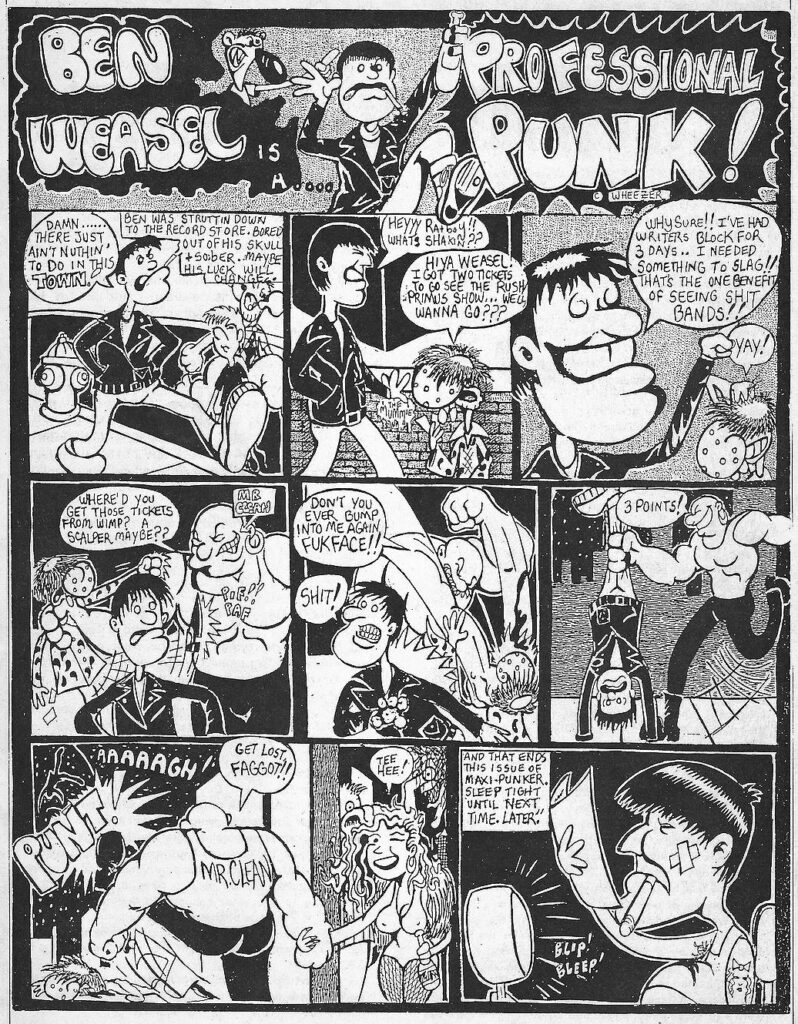
Published in Jersey Beat #50, from 1993.
Besides music, one of your passions is cooking.
Where did that passion come from?
Can you give us a recipe that you invented yourself?
My grandmother was an amazing cook and she learned from my great-grandmother (who taught my mom how to cook, since grandma worked in an embroidery factory.)
Our holiday meals were legendary and our table welcomed all kinds of strays – widowed aunts, bachelor uncles, family friends, anyone who didn’t have a place to go was welcome. So I grew up with an enormous respect for food as part of my culture and once I was an adult and fending for myself, I transferred that passion to my own cooking.
When I started cooking for myself, it was basic Italian American but with the advent of Food Network (and celebrity chef culture,) my repertoire expanded to include Mexican chilis and Asian stir fries and Thai curries.
Most of my recipes are things I learned how to make and then tweaked over the years to my own specifications, like my spaghetti sauce (which North Jerseyans call “gravy.”)
I make amazing meatballs and very good chili, too.
My grandmother made wonderful Milanese risotto with saffron, Italian sausage, and chicken stock every Sunday; I came up with my own variation using several different kinds of mushrooms, but the basic techniques are timeless.
I think it’s like that for all cooking.
To invent a recipe completely by myself, I’d have to find an ingredient or style no one else has used before. Mostly you just learn techniques, then fiddle with the ingredients until you get something that tastes good.
Can you show a picture of your favorite kitchen appliance?
The humble garlic press.
You can slice garlic with a razor blade like in Goodfellas, you can mince or chop it with a knife, and it’s very trendy these days to grate it with a rasp, but I like my garlic press.
No peeling, no fuss, no waste.
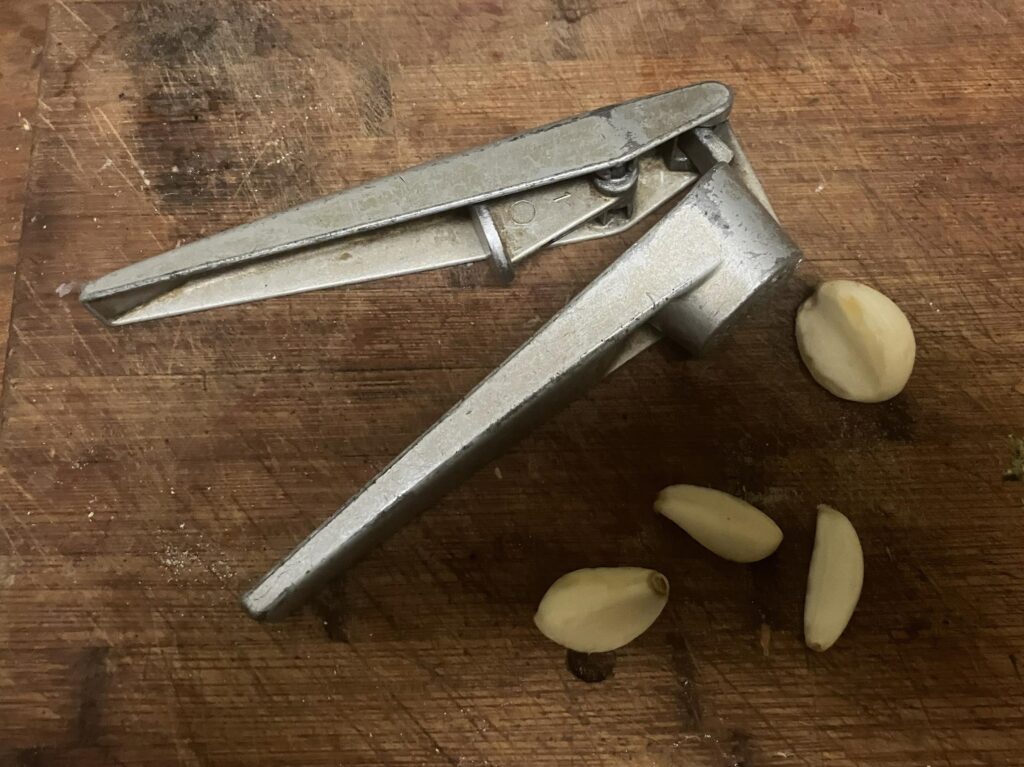
You love cats.
What do you think is the difference is between ‘dog people’ and ‘cat people’?
Dog people like to leave the house and cat people like to stay inside.
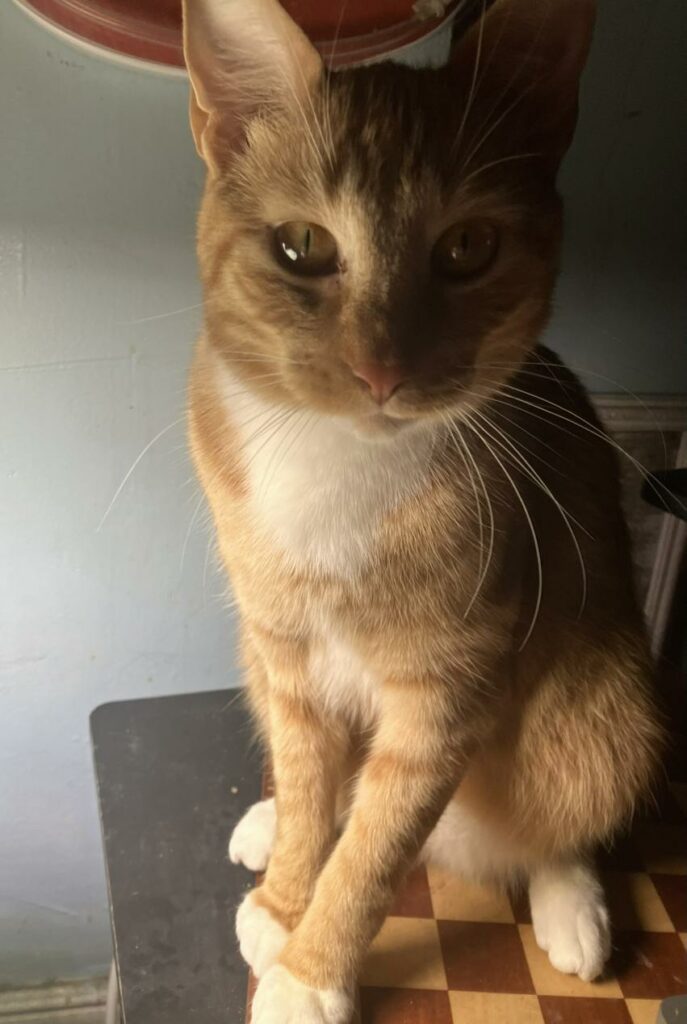
Do you ever play the lottery?
Why or why not?
No.
Why play a rigged game you’re not going to win?
I don’t gamble at casinos for the same reason.
I will occasionally buy a scratch off card because it provides a few seconds of entertainment. So I’ve never won a million dollars in the lottery – Have you?
The difference is that I haven’t wasted thousands of dollars on tickets over the years.
Do you find your day job as a teacher of learning-disabled kids creatively challenging, frustrating, both, or something else?
It is challenging and rewarding.
I was never trained as a teacher (although I certainly mentored a lot of young writers at Jersey Beat) and now I have to fill seven hours a day with Math, English, Social Studies, and Science. So there’s an enormous amount of prep involved.
It can be frustrating because, due to the learning disabilities, it’s Sisyphean: We get to the top of the hill and then the stone rolls down to the bottom and we have to do it all again.
Patience is not merely a virtue doing this, it’s as necessary as air or water.
There was a time in the Eighties when I was helping agents sell disability insurance and was proud of my job; we were delivering a quality product at a good price that helped people when they needed it.
But the products and business and my enthusiasm all changed and by the millennium, it was a joyless slog. I should have gotten out much sooner than I did. Teaching has been a salvation; it keeps me busy and challenged and engaged, and sadly, I do still need a paycheck to augment my so-called “retirement.”
If antibiotics and probiotics got into a fight, who would win and why?
In my experience, probiotics don’t work and antibiotics do, so no contest.
We’ve talked before about how we’re both happy we are old and we have no progeny to experience the world going completely to shit.
When do you think there will be an earth without humans?
Do you think that’ll be a “bad thing?
I try to keep a Gene Roddenberry outlook and believe that mankind will survive climate change, avoid nuclear Armageddon, and come out better on the other side, but my optimism shrinks every day.
Sadly, if the earth does become depopulated, I am pretty sure it will be because the planet can no longer sustain life and not because everyone has left for another galaxy, or we were wiped out by Martians.
By the time the entire world realizes the true existential peril of climate change, it will be too late. And eventually we’re going to run out of fossil fuels, people seem to have forgotten that.
I think the world will be a very dark and different place in 50 years and doubt mankind will make it another 100.
You’re an old hand at interviewing.
I’ve talked with people for other writing, but never done a Q&A interview before.
What am I doing right and wrong with this one?
The best interviews are conversations, so the best questions inspire discussion and not just short concise replies.
The biggest compliments I can get as an interviewer is when my subject says, “No one’s ever asked me that before” or “that’s a really hard question, let me think about it.”
Do you like hearing from fans/readers?
If so, what is your preferred method (email, Facebook, text message, twitter, etc.)?
I love hearing from people, especially people I wrote about years ago who want to catch up or turn me on to a new project they’re doing. And I am fine with musicians/bands hitting me up for a review.
But… I want them to do it by email: jim@jerseybeat.com.
One thing I don’t like is getting sent links or files or pitches on Instagram or Facebook Messenger or Twitter. That’s not what social media is for.
Are there any other questions you would have liked me to ask, but didn’t?
If so, please ask them yourself and answer them.
I mentioned that I taught myself guitar in college, I didn’t mention that I’ve also written songs and performed for the last 20 years or so.
In the mid-Eighties, my friend Howard Wuelfing (yeah, him again) got a job in NJ and moved from D.C. We started a band with some mutual friends doing mostly Howard’s songs and played around North Jersey (including Maxwell’s four times, which was pretty good given that we were only together for two years.)
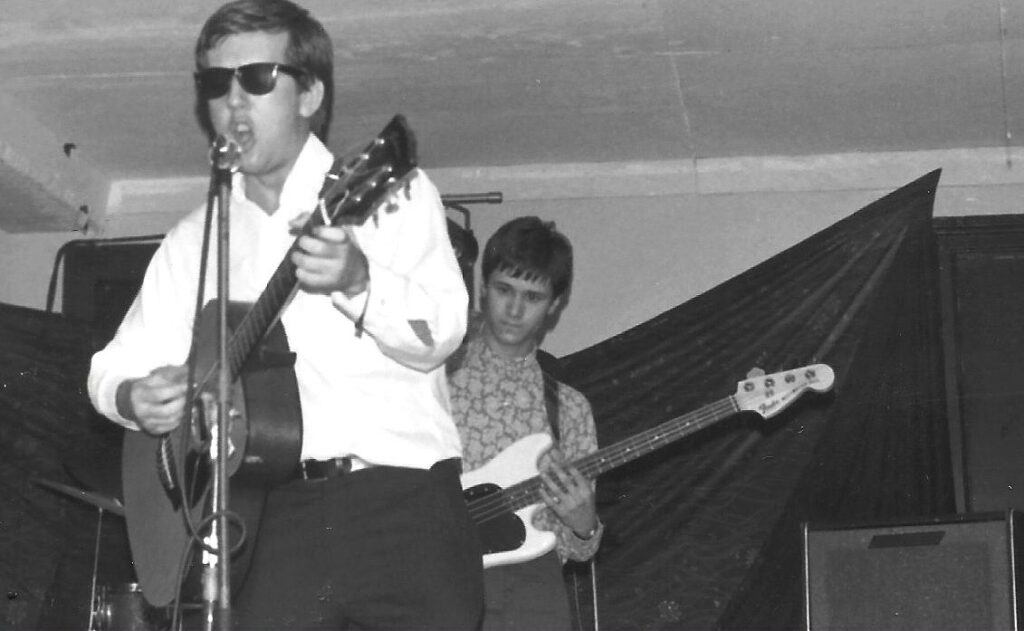
After that, I stayed in my lane as a rock critic for a long time.
In the early 2000’s, I basically got pushed onstage to do a set at something called W.E. Festival in Wilmington, NC. I enjoyed it so much that I took up a very dilettantish career as a singer/songwriter, writing and playing only when I got the urge without ever pursuing it as more than an entertaining hobby.
I don’t have much talent and a vocabulary of about 10 chords, but hey, Elvis only knew three.
And I do have a lot of talented friends, whom I’ve enlisted in the studio and on stage over the years, so at least the recordings are pretty good.
If anyone is curious, the EP’s and singles I’ve released are available at jimtesta.bandcamp.com and my first EP, for reasons that elude me, is streaming on Spotify.
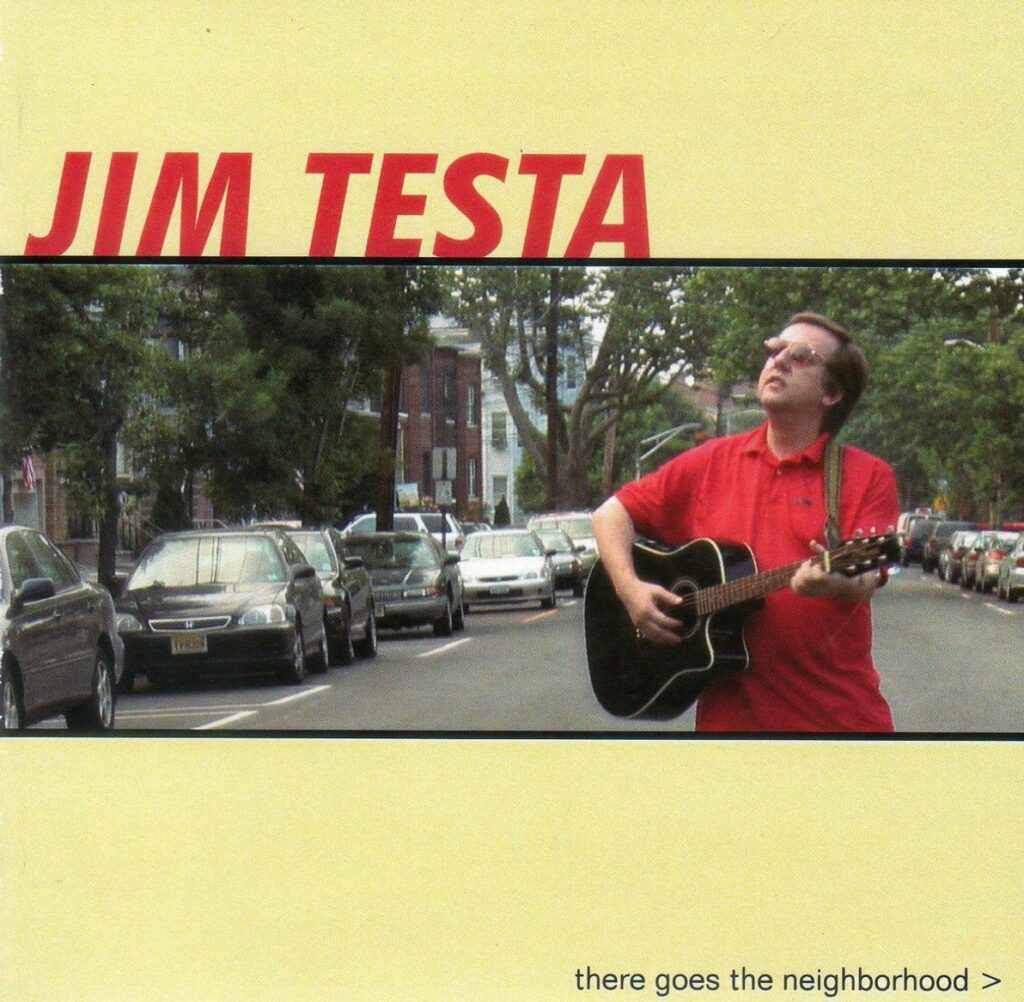
The other thing we didn’t mention is the Jersey Beat Podcast, which I started in 2006 when very few people knew what a podcast was, and you were only supposed to play royalty-free music (there was a special website for it.)
Of course, between comedy and political and true crime podcasts, the genre has exploded into the mainstream and everybody has one now, while mine has been on hiatus for about six months. But I am getting the itch to start it up again.
The JB Podcast alternated music playlists (before they were called that) of tracks I reviewed with interviews of musicians (and a few authors.)
I managed to land a few well-known people to do interviews, some of which I’m very proud.
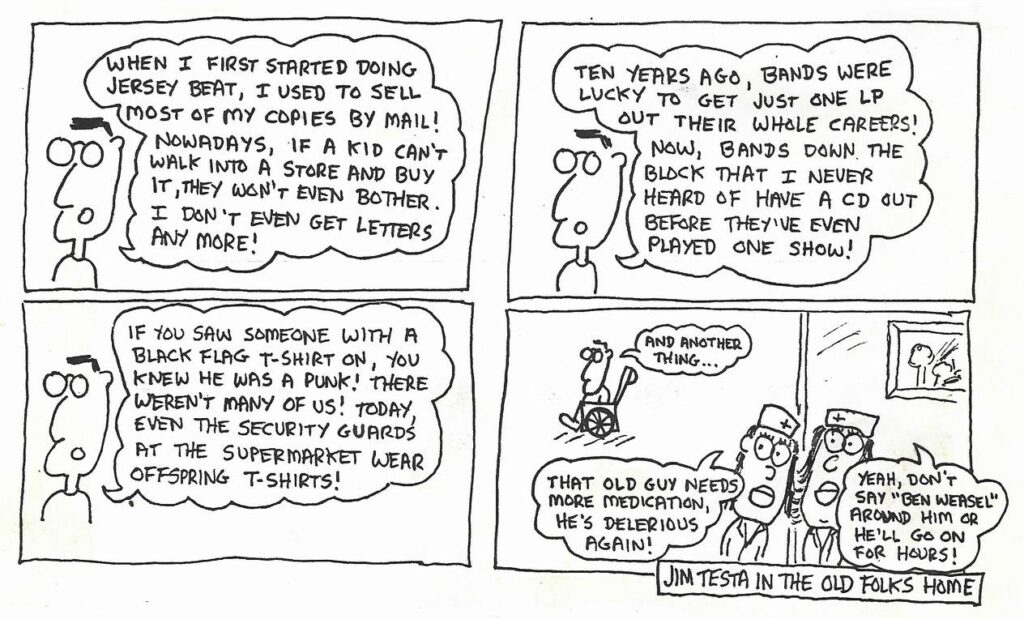
(Originally published in a 1987 issue of Jersey Beat.)
Links
- Jersey Beat – Website
- Jersey Beat – Podcast
- Jersey Beat – Facebook
- Jim Testa – NJ.com Writer Profile with Pieces
- Jim Testa – Facebook
- Jim Testa – Instagram
- Jim Testa – twitter
- Jim Testa – Bandcamp
- Jim Testa – Discogs Entry
- Jim Testa – Spotify Page
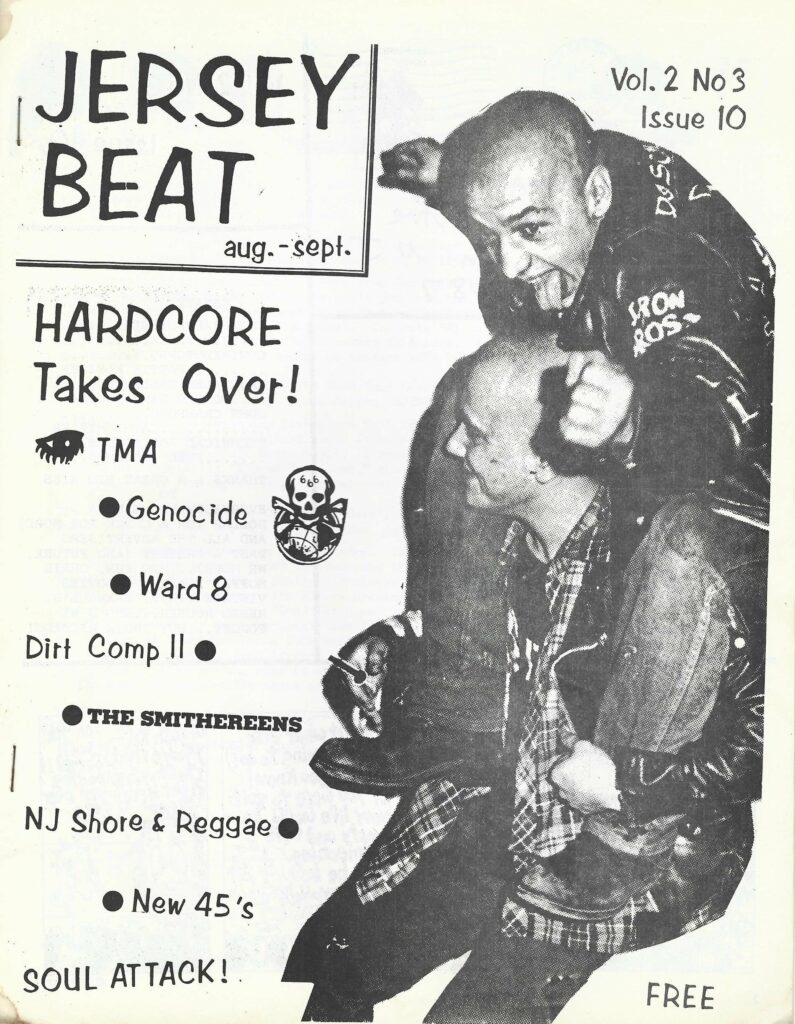
All images supplied by Jim.
